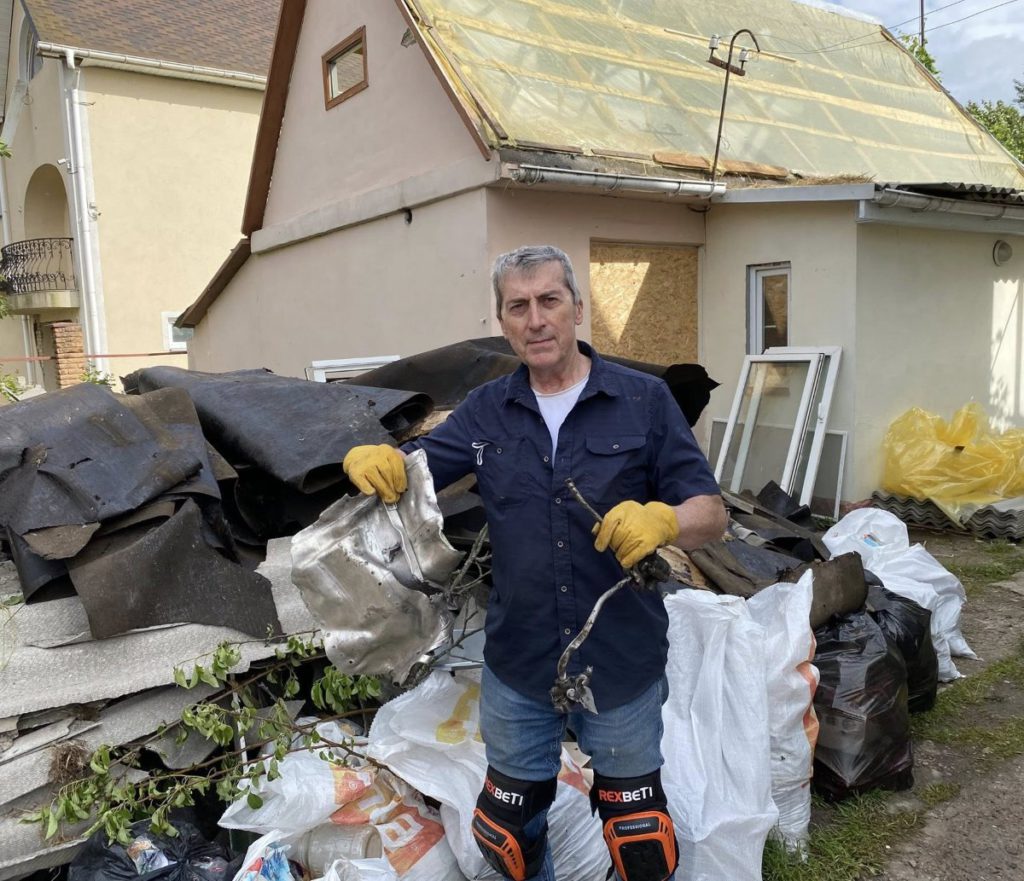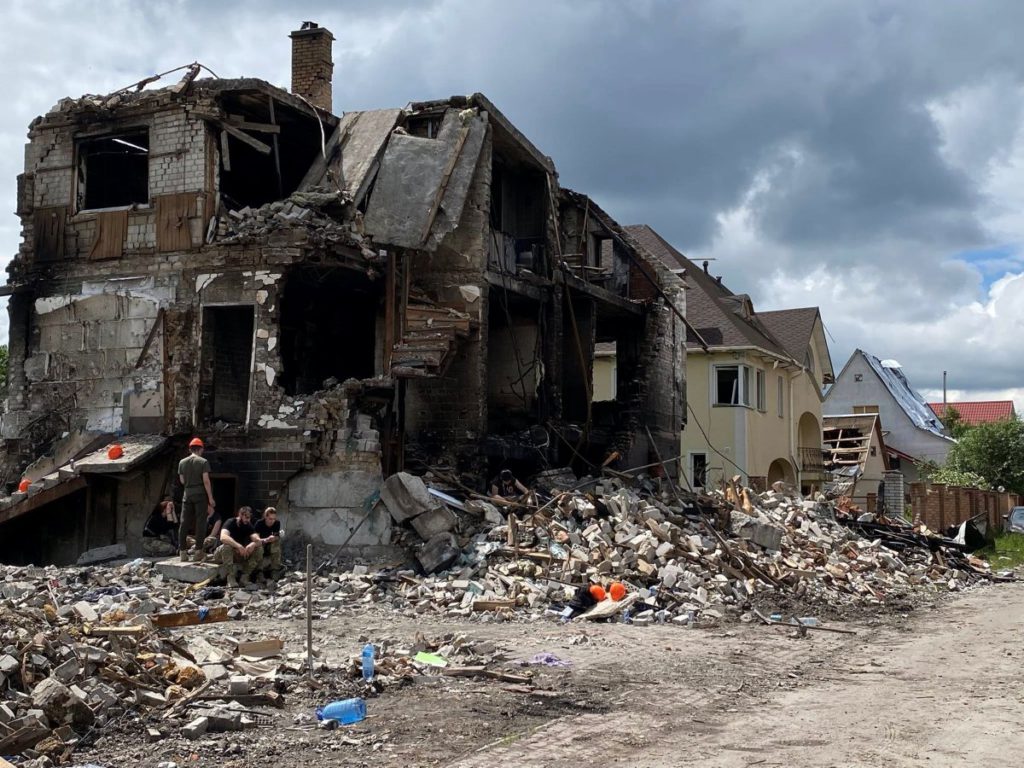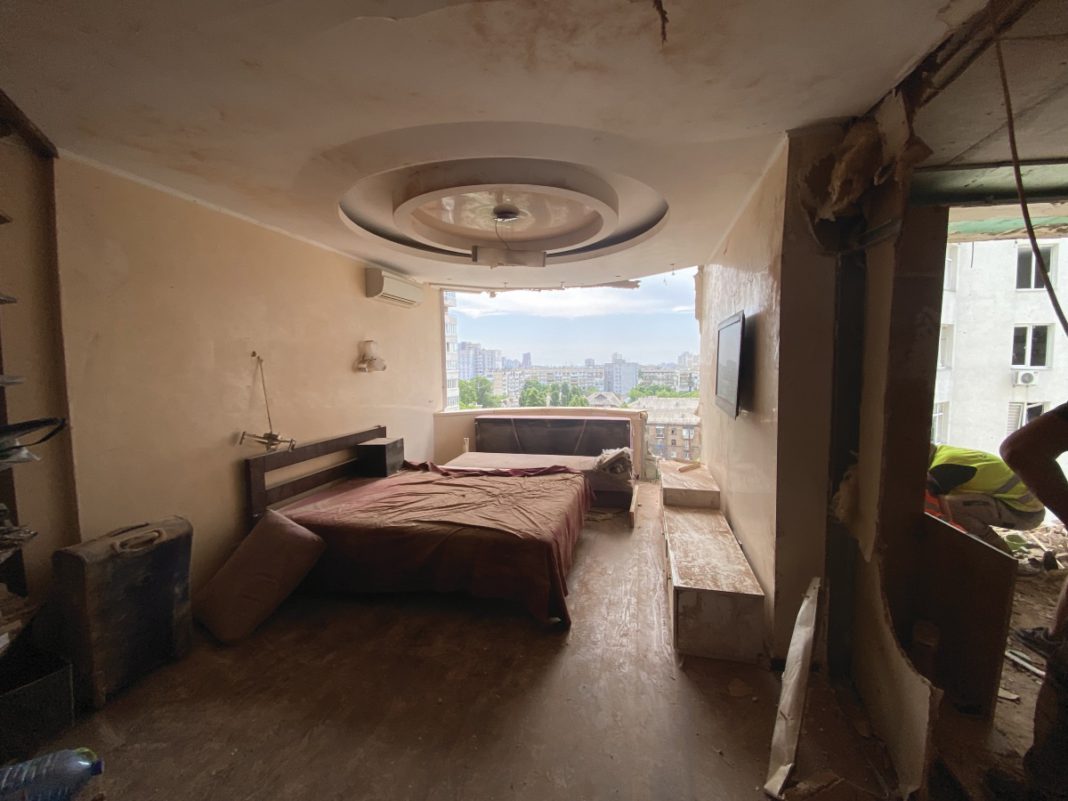In April, Ron Albert sat in his comfortable Sausalito home watching a 60 Minutes interview with Ukraine President Volodymyr Zelenskyy.
Six weeks later, Albert, a semi-retired attorney, was on the ground in the war-torn country, helping rebuild homes hit by Russian air raids.
“That horrific White House meeting, only about a month before, where Trump and JD Vance were berating Zelenskyy, had made me angry,” Albert said. “The 60 Minutes episode brought home those feelings again, and I turned off the TV and said, ‘I’m going to volunteer in Ukraine.’”
Russia’s unprovoked invasion of Ukraine began more than three years ago. A study released last month by the Center for Strategic and International Studies in Washington estimates the war has killed between 60,000 and 100,000 Ukrainian soldiers, with as many as 250,000 Russian fatalities in Ukraine.
Despite the danger of entering a country under siege, Albert, 68, felt compelled to assist the people of Ukraine. Initially, his online research brought up information about joining the Ukrainian army. Digging deeper, he found a website with links to local organizations coordinating emergency repairs to damaged buildings.
“I thought this was fantastic,” Albert said. “Definitely, you need to help Ukrainian refugees, but these groups are minimizing the number of refugees by helping people stay in their homes.”
After completing the online forms to volunteer, Albert received an automatic reply from one organization and nothing from the other two. Each of the groups had donation links, and he began to wonder if someone had set up websites just to solicit money.
Instead of dampening his enthusiasm, it motivated him to investigate further. Albert noted that a group’s site included features on individual international volunteers. Two had unique names, and he found them, one American and one Swedish, on Facebook. Both men had posted about volunteering in Ukraine. He sent each a detailed message.
A few days later, Albert received a response from the American, Jason. Yes, the organizations were legitimate, although underfunded, with nobody to monitor the websites. Jason connected him with volunteers living in Ukraine through Telegram, a popular encrypted messaging app.
“Alberto, a Brazilian expat, answered a couple of my questions,” Albert said. “He confirmed: ‘Come on over—all these organizations need workers. It’s not predictable, but there will be work for you.’ So, that gave me the assurance I needed, and I booked my trip.”
With no commercial flights into Ukraine, on May 19, he flew to Warsaw, Poland. From there, he spent 16 hours on a series of trains to Kyiv, Ukraine’s capital.
“I was struck by the normalcy of it,” Albert recounted. “When I arrived at the Kyiv train station, people were bustling about, with just a handful in military uniforms. I got a ride share to my apartment in the central part of the city, and it was like Union Square in San Francisco—people shopping and cars crowding the street. You would have no indication there was a war going on.”
His apartment, just a block and a half from the government center, was well-protected by the robust air defense in the area. However, Russia does use drones and missiles to attack the sprawling city of three million people, causing damage mostly to Kyiv’s periphery, according to Albert.
On his first day, while away from the apartment, he heard an air raid siren. Unsure of where to go, he decided to follow someone on the street. Yet nobody broke stride or showed panic, nor did they seem to be rushing to a bomb shelter.
“In central Kyiv, they hear air raid sirens all the time, and they’re just sort of immune to it,” Albert said. “Or maybe they’ve developed so much confidence in the air defense system in the central area that they don’t react.”
Soon, Albert got used to the sounds of sirens and drone assaults, and even the explosions he heard when the drones were shot down. Most of the strikes happened after midnight, and he didn’t even get out of bed.
Still he admits that not everyone is so nonchalant. A friend keeps an air mattress in a backpack and sleeps in the Kyiv Metro, one of the deepest subways in the world, during attacks.
“Putin claims he’s targeting military installations,” Albert said. “But they’re consistently hitting residential buildings, not military targets.”

Hence, the immense need for volunteers to help rebuild damaged homes. During his 24-day trip, the physically fit Albert worked with five different local organizations. The first, Repair Together, brought him north, about 10 miles from the Russian border, to an area invaded by the Russian army. Ukraine had successfully pushed back the enemy, but nine family residences were destroyed. Albert and the other volunteers, mostly millennials, constructed new homes during the day and slept in tents at night.
Another group, Dobrobat, put him to work in a residential building on the outskirts of Kyiv that had been damaged in a drone attack. An older woman lived in the apartment, and she worked alongside the volunteers to clean out the debris.
“Where there had been a wall with a window was now just open to the outside,” Albert said. “The resident, she wasn’t crying; she was just matter-of-fact dealing with the situation and getting on with it.”
Albert described one of his volunteer jobs as working on the “plywood crew.” Ukrainian residents would line up with measurements for windows broken from the shock of explosions, he explained. The volunteers cut the plywood to order from huge sheets.

As part of a demolition team for Brave to Rebuild, Albert helped jackhammer concrete floors and non-load bearing walls from a large building that will become a veterans’ rehabilitative center.
“At least 50% of our crews were Ukrainian women breaking up the concrete and loading it in sacks,” he said. “I put the sacks onto a wheelbarrow and took it to the other side of the building, so I would get into fresh air for a minute or two. But the rest of the people were in that dust cloud all morning and all afternoon.”
The stoicism and resilience of the Ukrainian people had a profound impact on Albert. Though he believes they’re exhausted by the war, he said they love their country and will never give in.
“They don’t want to leave Ukraine,” he noted. “They’re not like people in other parts of the world who are eager to immigrate to the West. That’s why I strongly encourage people to volunteer to help Ukraine rebuild their residences.”
Join Ron Albert for his presentation, Witness to Resilience: A Volunteer Mission in Ukraine, from 4-5:30pm on Sunday, Aug. 10, at the Sausalito Center for the Arts. Free admission. Tickets available at Eventbrite.
For information on the emergency rebuilding organizations, visit repair-together.com/home, dobrobat.in.ua/en and bravetorebuild.in.ua/en.










Another terrific Nikki Silverstein article that deep dives into important human interest stories. And what could be more human than Ron traveling to Ukraine to help our allies who are fighting our war against the Russian invaders? Looking forward to Ron’s interview at the Sausalito Center for the Arts on August 10th.
To Nikki and Ron: Thanks for what you do! Her
Nothing but admiration for your courage and brotherly love.